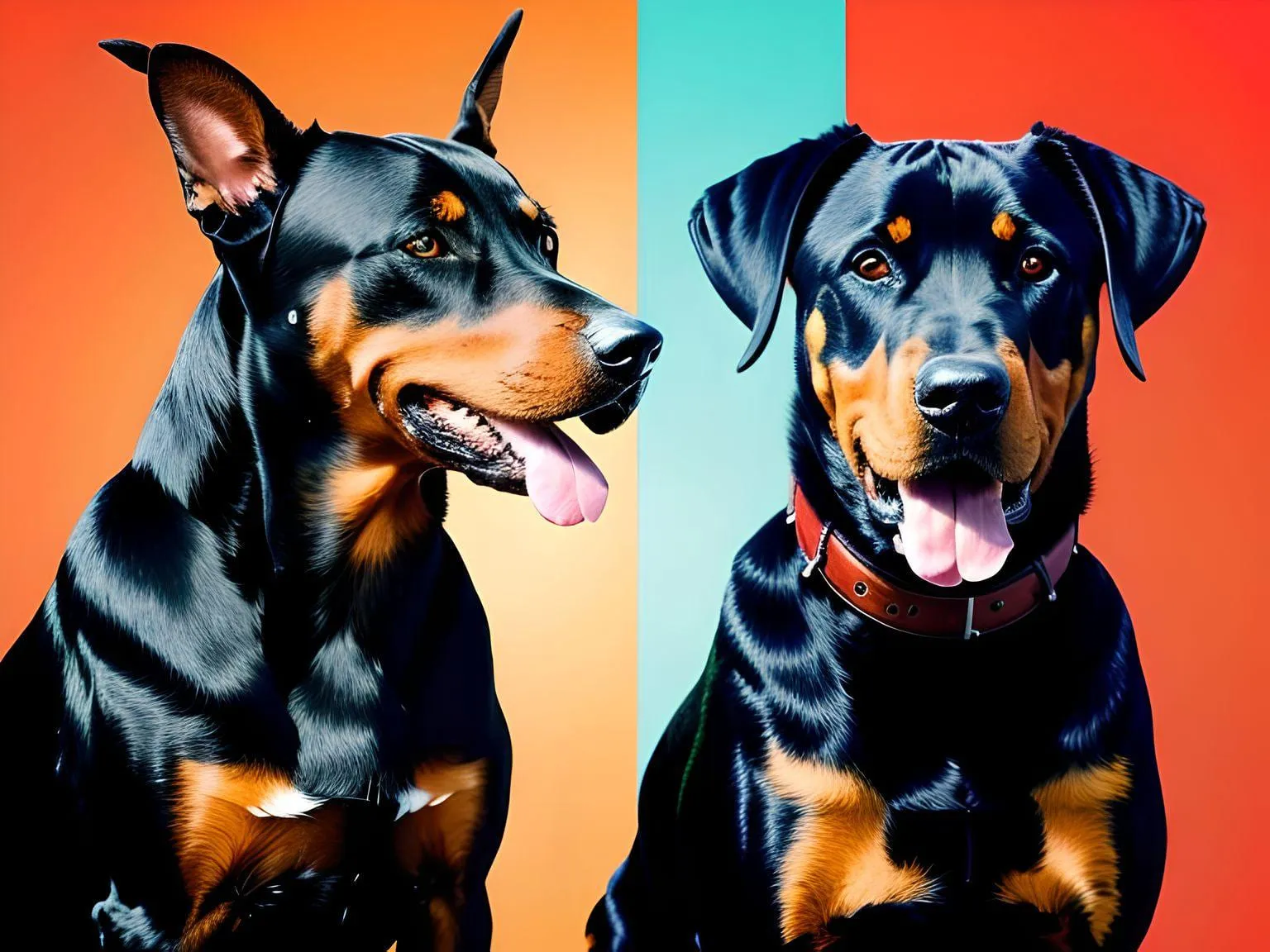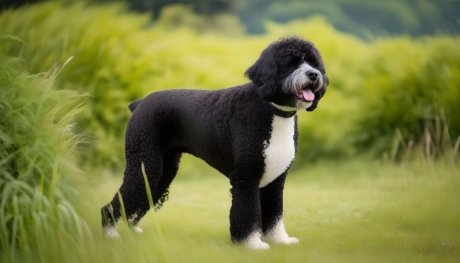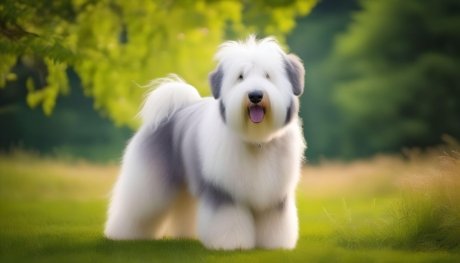Doberman vs Rottweiler | Differences, Prices, Similarities, Care, Health
When it comes to dog breeds, the Doberman Pinscher and Rottweiler are both highly recognizable and sought-after. These two breeds possess unique qualities and characteristics that make them popular choices for dog enthusiasts around the world. In this article, we will delve into the fascinating world of Dobermans and Rottweilers, exploring their historical backgrounds, physical attributes, temperaments, exercise and training needs, health considerations, living conditions, and family compatibility, as well as addressing legal restrictions and stereotypes. By the end of this comprehensive guide, you’ll have a deeper understanding of these remarkable breeds, enabling you to make an informed decision when choosing the perfect canine companion for your lifestyle.
Doberman vs Rottweiler:
Here is a comparison and the key differences between Doberman Pinschers and Rottweilers:
| Aspect | Doberman Pinscher | Rottweiler |
|---|---|---|
| Origin | Germany | Germany |
| Size | Medium to large | Large |
| Physical Appearance | Sleek, elegant, muscular | Robust, powerful |
| Coat Colour | Black, red, blue, fawn | Black with mahogany markings |
| Temperament | Loyal, protective, energetic | Confident, courageous, steady |
| Trainability | Highly intelligent, trainable | Intelligent, trainable |
| Exercise Needs | High | Moderate |
| Health Concerns | Hip dysplasia, heart issues, hypothyroidism | Hip dysplasia, heart issues, certain cancers |
| Living Conditions | Adaptable to various living conditions | Access to outdoor space is beneficial |
| Family Compatibility | Good with proper socialization and training | Good with proper socialization and training |
| Compatibility with Pets | Can coexist with proper socialization | Can coexist with proper socialization |
| Aggression Towards | Wary of strangers, proper socialization needed | Wary of strangers, proper socialization needed |
| Novice Owner Suitability | Requires dedicated training and responsibility | Requires dedicated training and responsibility |
Historical Background
The Doberman Pinscher was developed in Germany in the late 1800s by a tax collector named Louis Dobermann to serve as a loyal and courageous bodyguard. The Doberman Pinscher soon earned a reputation for its remarkable traits as a working and companion dog due to meticulous breeding and selection.
On the other hand, the Rottweiler’s origins can be traced back to ancient Rome, where they were utilized as herding and guarding dogs. These versatile canines found their way to the town of Rottweil in Germany, from which they derived their name. Over the centuries, Rottweilers evolved into formidable working dogs, excelling in various roles such as herding, cart pulling, and even serving as police and search and rescue dogs.
Physical Attributes
Medium to huge in size, the Doberman Pinscher has a sophisticated look. They grow strongly have a broad chest, and a magnificent head with a distinct stop. Black, red, blue, and fawn are just a few of the coat colours and patterns available for Doberman pinschers. They also sometimes have striking rust-coloured markings on their chest, legs, and nose.

Rottweilers, on the other hand, have a compact, muscular physique and are strong, powerful canines. They have a short, thick coat, a large skull, and strong jaw muscles. The normal coat colour of a Rottweiler is black, with distinct mahogany markings on the cheeks, chest, legs, and eyebrows.
Temperament and Personality Traits
Doberman Pinschers are known for their intelligence and trainability. They have genuine loyalty and protectiveness towards their family, making them great guard dogs. Their enthusiasm and energy make them perfect for active adults or families who can give them with mental and physical stimulation. However, proper socialisation and training are required to help kids channel their energy effectively.
Rottweilers, on the other hand, are recognised for their confidence, bravery, and territorial behaviours. They have a calm and peaceful demeanour, making them loyal and consistent companions. Rottweilers are very devoted to their family and have an innate desire to protect them. Their balanced temperament and innate courage make them a preferred option for duties requiring both strength and mental stability.
Exercise and Training Needs
Doberman Pinschers are energetic dogs that require regular exercise to keep them physically and mentally stimulated. Long walks, jogging, and engaging in interactive play sessions are essential for their well-being. Furthermore, Dobermans thrive when presented with mental challenges, so incorporating obedience training, agility exercises, and puzzle toys into their routine is highly beneficial.

Rottweilers, despite their robust appearance, have moderate exercise needs. Daily walks and playtime are sufficient to meet their exercise requirements. However, it’s crucial to ensure that Rottweilers receive consistent training from an early age to prevent behavioural issues. Obedience training, socialization with other dogs and people, and engaging in activities such as tracking or obedience trials can help channel their energy in a positive direction.
Health Considerations
Both Dobermans and Rottweilers are generally healthy breeds; however, they are prone to certain genetic conditions and health issues that potential owners should be aware of. Doberman Pinschers may be susceptible to conditions such as hip dysplasia, von Willebrand’s disease, dilated cardiomyopathy, and hypothyroidism. Responsible breeding practices and regular veterinary check-ups are essential to mitigate these risks.
Similarly, Rottweilers have a predisposition to health concerns such as hip and elbow dysplasia, heart conditions, and certain types of cancers. Routine health screenings, a balanced diet, regular exercise, and appropriate veterinary care are crucial to ensuring their overall well-being.
Living Conditions and Adaptability
Doberman Pinschers are adaptable dogs that can thrive in various living conditions, provided their exercise and mental stimulation needs are met. They can adjust to apartment living if given sufficient exercise and mental stimulation, although access to a secure outdoor area is beneficial. Additionally, Dobermans can tolerate different climates, but they may require extra care in extreme weather conditions.

Rottweilers are well-suited to homes with a yard or access to outdoor space. They enjoy having room to roam and explore. While Rottweilers can adapt to different climates, they may struggle in extreme heat due to their short coat. It’s crucial to provide them with shade and ample fresh water during hot weather.
Family and Social Compatibility
Both Doberman Pinschers and Rottweilers can make excellent family pets when raised in a loving and well-structured environment. Dobermans are known for their affinity towards children and can form strong bonds with them. However, early socialization and supervision are essential to ensure harmonious interactions.
Rottweilers, with their protective instincts and loyalty, are also generally good with children, but they require proper socialization from an early age. Additionally, ongoing socialization with other animals and exposure to various environments can help them become well-rounded companions.
Legal Restrictions and Stereotypes
Doberman Pinschers, unfortunately, have been subject to breed-specific legislation and negative stereotypes in some regions due to their historical association with guarding and protection. It’s important to note that responsible ownership, proper training, and socialization are the keys to raising a well-behaved Doberman that can positively contribute to society.

Similarly, Rottweilers have faced legal limitations and stereotypes due to their size, strength, and protective nature. Responsible ownership, along with educating the public about the breed’s true characteristics and abilities, can help challenge these stereotypes and promote a fair perception of Rottweilers.
Conclusion:
In conclusion, both Doberman Pinschers and Rottweilers are exceptional breeds with distinctive traits and qualities that make them popular choices for dog enthusiasts. Understanding their historical backgrounds, physical attributes, temperaments, exercise and training needs, health considerations, living conditions, family compatibility, and addressing legal restrictions and stereotypes is crucial when considering these breeds as potential companions. By making an informed decision and providing responsible ownership, you can ensure a fulfilling and harmonious relationship with either a Doberman or a Rottweiler for many years to come.
Frequently Asked Questions on Doberman vs Rottweiler:
-
Are Doberman Pinschers aggressive?
: Doberman Pinschers have a reputation for being protective and alert, but it’s important to note that aggression is not a characteristic inherent to the breed. Like any dog, their temperament largely depends on how they are raised and trained. Proper socialization, positive reinforcement training, and responsible ownership play a significant role in shaping a Doberman’s behaviour.
-
Do Rottweilers make good family pets?
Yes, Rottweilers can make excellent family pets. They are known for their loyalty, affection, and protective nature. However, it’s crucial to provide them with early socialization and obedience training to ensure they understand appropriate behaviour around family members and other animals. Responsible ownership, including providing them with proper exercise and mental stimulation, is key to fostering a harmonious relationship between a Rottweiler and a family.
-
Which breed is better for first-time dog owners, a Doberman or a Rottweiler?
Both Dobermans and Rottweilers are appropriate for first-time dog owners, but there are certain aspects to consider. Dobermans are very clever dogs who require mental stimulation as well as constant training. They may be a suitable option for owners who are prepared to devote time and effort in their training. Rottweilers, with their calm and stable demeanour, may be more tolerant of inexperienced owners. However, regardless of the owner’s expertise level, early socialisation and obedience training are essential for both breeds.
-
How much exercise do Dobermans and Rottweilers need?
Dobermans and Rottweilers have different exercise needs. Dobermans are energetic dogs that require daily exercise to keep them physically and mentally stimulated. They benefit from activities such as long walks, jogging, and interactive play sessions. Rottweilers, although robust, have moderate exercise requirements. Daily walks and playtime are generally sufficient to meet their needs. However, it’s important to remember that every dog is an individual, and exercise requirements may vary based on factors such as age, health, and overall energy levels.
-
What health issues are common in Doberman Pinschers and Rottweilers?
Doberman Pinschers are prone to certain health issues, including hip dysplasia, von Willebrand’s disease, dilated cardiomyopathy, and hypothyroidism. Responsible breeding practices and regular veterinary check-ups are crucial to identify and manage these conditions effectively. Rottweilers can also be susceptible to health concerns such as hip and elbow dysplasia, heart conditions, and certain types of cancers. Routine health screenings and a proactive approach to their healthcare can help prevent or address potential issues.
-
Can Dobermans and Rottweilers live in apartments?
Although Dobermans and Rottweilers are medium to big breeds, they may adapt to apartment living if their activity and mental stimulation demands are addressed. It’s important to remember, though, that they both require frequent exercise and mental stimulation, so giving them access to outside settings like a securely fenced yard or local parks is useful. Spending quality time with them, as well as engaging in interactive play and training sessions, is also important for keeping them happy and balanced.
-
Are Dobermans and Rottweilers good with children?
Yes, both Dobermans and Rottweilers can be good with children when properly socialized and trained. However, it’s crucial to supervise interactions between dogs and children and teach children how to interact respectfully with dogs. Early socialization and positive experiences with children can help foster a strong bond and ensure harmonious relationships between these breeds and kids.
-
Do Dobermans and Rottweilers get along with other pets?
Dobermans and Rottweilers can coexist peacefully with other pets, including cats and other dogs, when introduced and socialized properly from an early age. However, individual personalities and temperaments can vary, so it’s important to monitor their interactions and provide appropriate training and supervision. Early socialization and gradual introductions can increase the likelihood of a successful multi-pet household.
-
Are Doberman Pinschers and Rottweilers aggressive towards strangers?
Doberman Pinschers and Rottweilers are naturally protective and suspicious of outsiders, making them ideal guard dogs. They may, however, learn to distinguish between pleasant guests and dangerous hazards with adequate socialisation and training. Early exposure to new people, places, and good experiences can help lessen the chance of stranger aggression.
-
Are Dobermans and Rottweilers suitable for novice dog owners?
Both Dobermans and Rottweilers require responsible ownership and dedicated training, making them better suited for owners who are willing to invest time and effort into their care. While they can be suitable for novice dog owners, it’s important to educate oneself about the specific needs and characteristics of these breeds, seek professional guidance, and provide them with consistent training, socialization, and proper healthcare.
Recommended Articles related to Doberman vs Rottweiler:
Doberman vs German Shepherd | 7 Differences, Prices, Similarities, Care
Alaskan Malamute vs Husky | 8 Differences, Similarities, Prices, Care





























